Veganism Report: Exploring Health Benefits, Dietary Needs, Nassau
VerifiedAdded on 2023/06/15
|9
|2301
|344
Report
AI Summary
This report explores the health benefits of veganism, contrasting it with non-vegan diets and highlighting its positive impact on conditions like obesity, diabetes, heart disease, and high blood pressure. It references multiple studies that demonstrate the effectiveness of plant-based diets in weight management, improved insulin sensitivity, and reduced cardiovascular risks. The report also addresses potential health concerns related to veganism, such as protein and vitamin deficiencies, and suggests plant-based sources to mitigate these risks. Ultimately, the paper advocates for healthcare providers to promote vegan diets as a primary approach to disease prevention and overall health improvement, emphasizing the importance of a nutrient-rich, plant-based lifestyle.
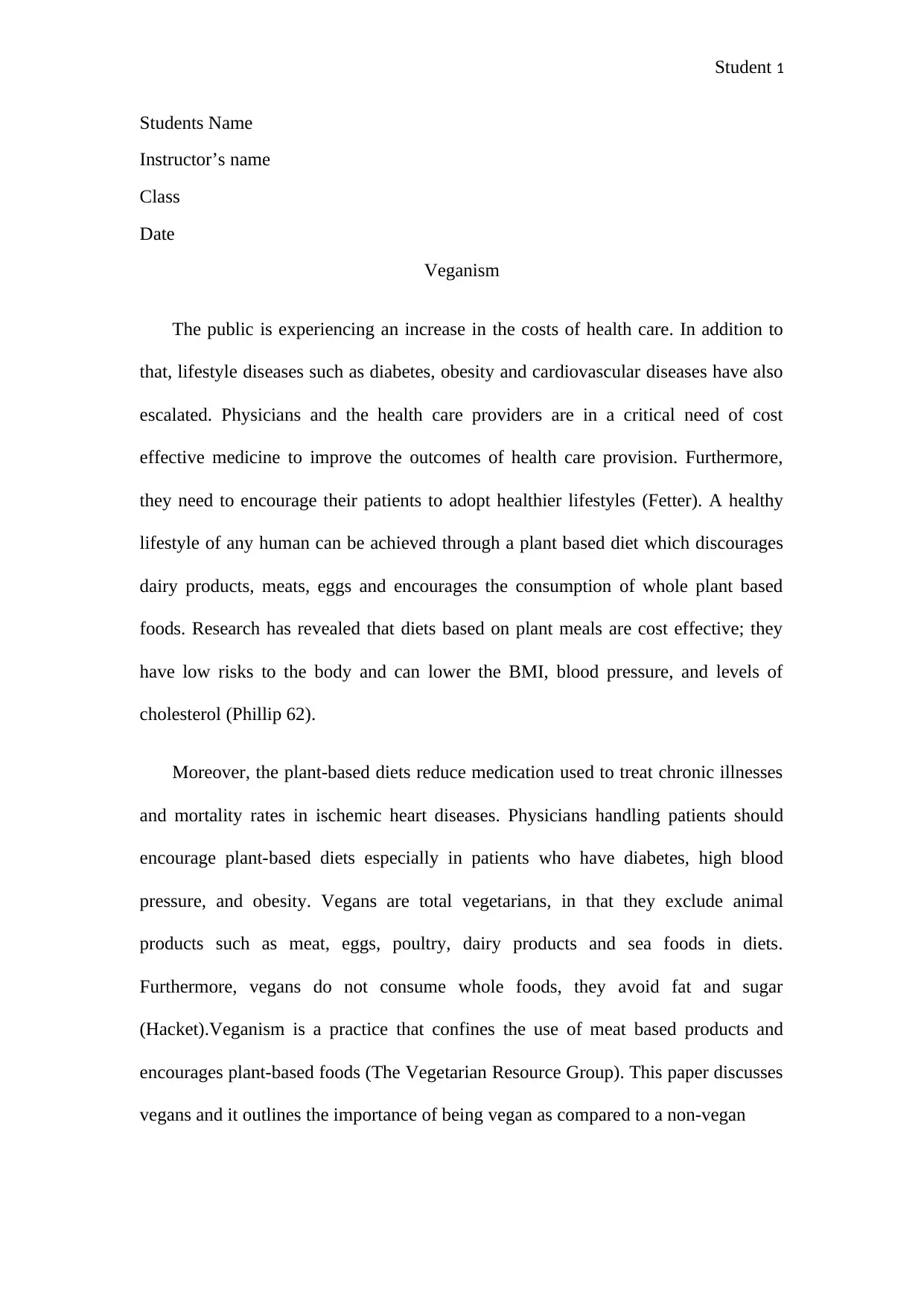
Student 1
Students Name
Instructor’s name
Class
Date
Veganism
The public is experiencing an increase in the costs of health care. In addition to
that, lifestyle diseases such as diabetes, obesity and cardiovascular diseases have also
escalated. Physicians and the health care providers are in a critical need of cost
effective medicine to improve the outcomes of health care provision. Furthermore,
they need to encourage their patients to adopt healthier lifestyles (Fetter). A healthy
lifestyle of any human can be achieved through a plant based diet which discourages
dairy products, meats, eggs and encourages the consumption of whole plant based
foods. Research has revealed that diets based on plant meals are cost effective; they
have low risks to the body and can lower the BMI, blood pressure, and levels of
cholesterol (Phillip 62).
Moreover, the plant-based diets reduce medication used to treat chronic illnesses
and mortality rates in ischemic heart diseases. Physicians handling patients should
encourage plant-based diets especially in patients who have diabetes, high blood
pressure, and obesity. Vegans are total vegetarians, in that they exclude animal
products such as meat, eggs, poultry, dairy products and sea foods in diets.
Furthermore, vegans do not consume whole foods, they avoid fat and sugar
(Hacket).Veganism is a practice that confines the use of meat based products and
encourages plant-based foods (The Vegetarian Resource Group). This paper discusses
vegans and it outlines the importance of being vegan as compared to a non-vegan
Students Name
Instructor’s name
Class
Date
Veganism
The public is experiencing an increase in the costs of health care. In addition to
that, lifestyle diseases such as diabetes, obesity and cardiovascular diseases have also
escalated. Physicians and the health care providers are in a critical need of cost
effective medicine to improve the outcomes of health care provision. Furthermore,
they need to encourage their patients to adopt healthier lifestyles (Fetter). A healthy
lifestyle of any human can be achieved through a plant based diet which discourages
dairy products, meats, eggs and encourages the consumption of whole plant based
foods. Research has revealed that diets based on plant meals are cost effective; they
have low risks to the body and can lower the BMI, blood pressure, and levels of
cholesterol (Phillip 62).
Moreover, the plant-based diets reduce medication used to treat chronic illnesses
and mortality rates in ischemic heart diseases. Physicians handling patients should
encourage plant-based diets especially in patients who have diabetes, high blood
pressure, and obesity. Vegans are total vegetarians, in that they exclude animal
products such as meat, eggs, poultry, dairy products and sea foods in diets.
Furthermore, vegans do not consume whole foods, they avoid fat and sugar
(Hacket).Veganism is a practice that confines the use of meat based products and
encourages plant-based foods (The Vegetarian Resource Group). This paper discusses
vegans and it outlines the importance of being vegan as compared to a non-vegan
Paraphrase This Document
Need a fresh take? Get an instant paraphrase of this document with our AI Paraphraser
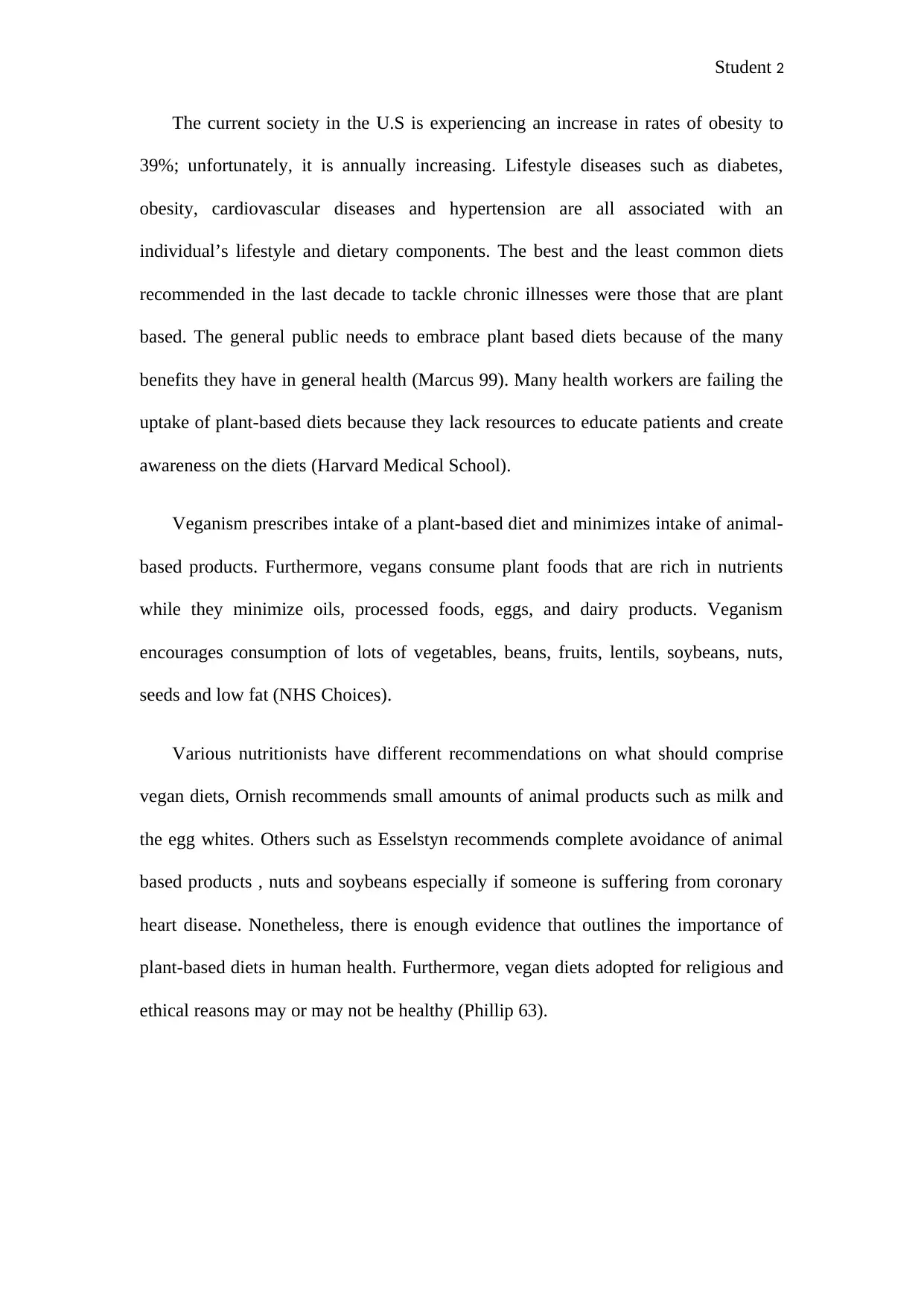
Student 2
The current society in the U.S is experiencing an increase in rates of obesity to
39%; unfortunately, it is annually increasing. Lifestyle diseases such as diabetes,
obesity, cardiovascular diseases and hypertension are all associated with an
individual’s lifestyle and dietary components. The best and the least common diets
recommended in the last decade to tackle chronic illnesses were those that are plant
based. The general public needs to embrace plant based diets because of the many
benefits they have in general health (Marcus 99). Many health workers are failing the
uptake of plant-based diets because they lack resources to educate patients and create
awareness on the diets (Harvard Medical School).
Veganism prescribes intake of a plant-based diet and minimizes intake of animal-
based products. Furthermore, vegans consume plant foods that are rich in nutrients
while they minimize oils, processed foods, eggs, and dairy products. Veganism
encourages consumption of lots of vegetables, beans, fruits, lentils, soybeans, nuts,
seeds and low fat (NHS Choices).
Various nutritionists have different recommendations on what should comprise
vegan diets, Ornish recommends small amounts of animal products such as milk and
the egg whites. Others such as Esselstyn recommends complete avoidance of animal
based products , nuts and soybeans especially if someone is suffering from coronary
heart disease. Nonetheless, there is enough evidence that outlines the importance of
plant-based diets in human health. Furthermore, vegan diets adopted for religious and
ethical reasons may or may not be healthy (Phillip 63).
The current society in the U.S is experiencing an increase in rates of obesity to
39%; unfortunately, it is annually increasing. Lifestyle diseases such as diabetes,
obesity, cardiovascular diseases and hypertension are all associated with an
individual’s lifestyle and dietary components. The best and the least common diets
recommended in the last decade to tackle chronic illnesses were those that are plant
based. The general public needs to embrace plant based diets because of the many
benefits they have in general health (Marcus 99). Many health workers are failing the
uptake of plant-based diets because they lack resources to educate patients and create
awareness on the diets (Harvard Medical School).
Veganism prescribes intake of a plant-based diet and minimizes intake of animal-
based products. Furthermore, vegans consume plant foods that are rich in nutrients
while they minimize oils, processed foods, eggs, and dairy products. Veganism
encourages consumption of lots of vegetables, beans, fruits, lentils, soybeans, nuts,
seeds and low fat (NHS Choices).
Various nutritionists have different recommendations on what should comprise
vegan diets, Ornish recommends small amounts of animal products such as milk and
the egg whites. Others such as Esselstyn recommends complete avoidance of animal
based products , nuts and soybeans especially if someone is suffering from coronary
heart disease. Nonetheless, there is enough evidence that outlines the importance of
plant-based diets in human health. Furthermore, vegan diets adopted for religious and
ethical reasons may or may not be healthy (Phillip 63).
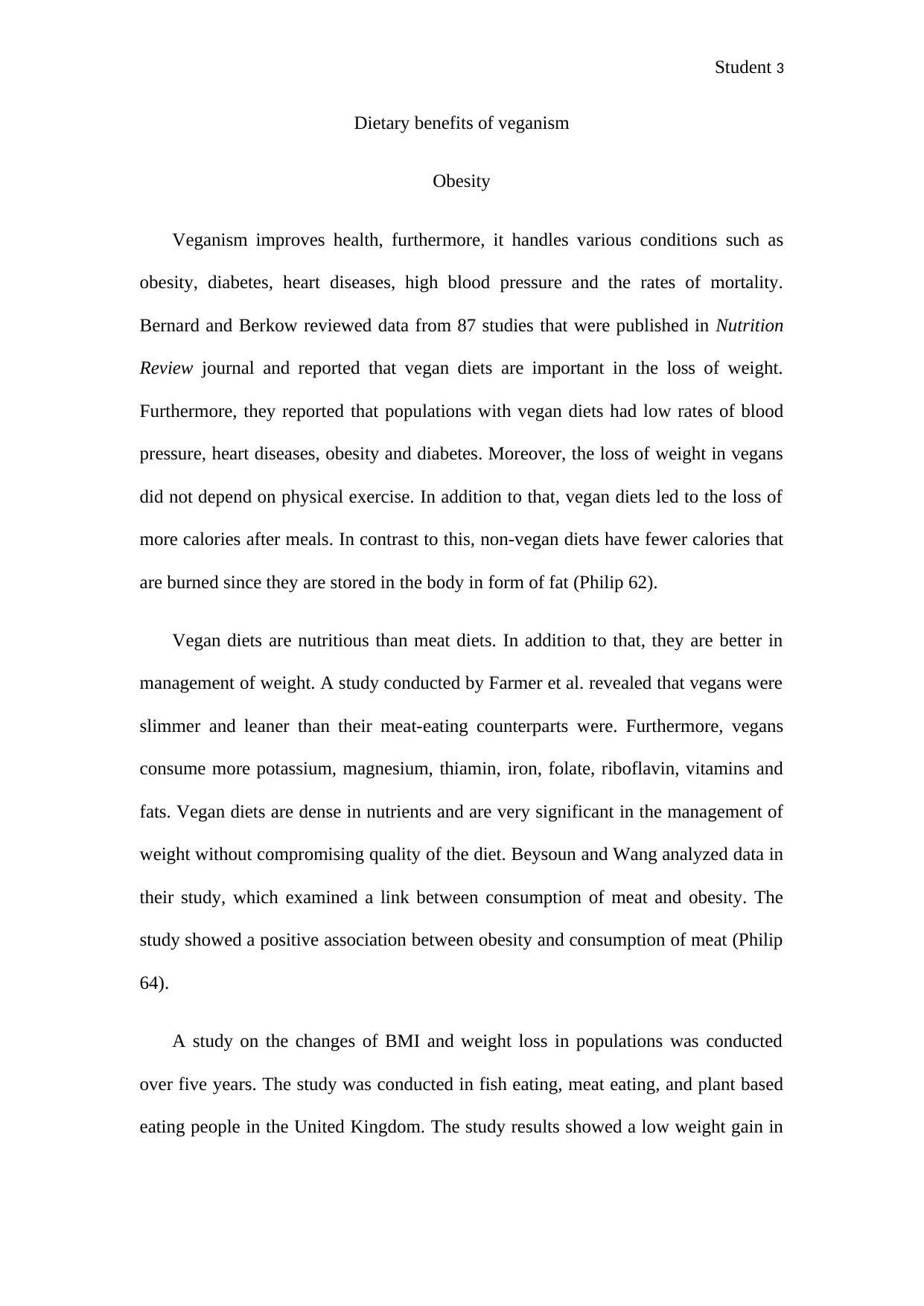
Student 3
Dietary benefits of veganism
Obesity
Veganism improves health, furthermore, it handles various conditions such as
obesity, diabetes, heart diseases, high blood pressure and the rates of mortality.
Bernard and Berkow reviewed data from 87 studies that were published in Nutrition
Review journal and reported that vegan diets are important in the loss of weight.
Furthermore, they reported that populations with vegan diets had low rates of blood
pressure, heart diseases, obesity and diabetes. Moreover, the loss of weight in vegans
did not depend on physical exercise. In addition to that, vegan diets led to the loss of
more calories after meals. In contrast to this, non-vegan diets have fewer calories that
are burned since they are stored in the body in form of fat (Philip 62).
Vegan diets are nutritious than meat diets. In addition to that, they are better in
management of weight. A study conducted by Farmer et al. revealed that vegans were
slimmer and leaner than their meat-eating counterparts were. Furthermore, vegans
consume more potassium, magnesium, thiamin, iron, folate, riboflavin, vitamins and
fats. Vegan diets are dense in nutrients and are very significant in the management of
weight without compromising quality of the diet. Beysoun and Wang analyzed data in
their study, which examined a link between consumption of meat and obesity. The
study showed a positive association between obesity and consumption of meat (Philip
64).
A study on the changes of BMI and weight loss in populations was conducted
over five years. The study was conducted in fish eating, meat eating, and plant based
eating people in the United Kingdom. The study results showed a low weight gain in
Dietary benefits of veganism
Obesity
Veganism improves health, furthermore, it handles various conditions such as
obesity, diabetes, heart diseases, high blood pressure and the rates of mortality.
Bernard and Berkow reviewed data from 87 studies that were published in Nutrition
Review journal and reported that vegan diets are important in the loss of weight.
Furthermore, they reported that populations with vegan diets had low rates of blood
pressure, heart diseases, obesity and diabetes. Moreover, the loss of weight in vegans
did not depend on physical exercise. In addition to that, vegan diets led to the loss of
more calories after meals. In contrast to this, non-vegan diets have fewer calories that
are burned since they are stored in the body in form of fat (Philip 62).
Vegan diets are nutritious than meat diets. In addition to that, they are better in
management of weight. A study conducted by Farmer et al. revealed that vegans were
slimmer and leaner than their meat-eating counterparts were. Furthermore, vegans
consume more potassium, magnesium, thiamin, iron, folate, riboflavin, vitamins and
fats. Vegan diets are dense in nutrients and are very significant in the management of
weight without compromising quality of the diet. Beysoun and Wang analyzed data in
their study, which examined a link between consumption of meat and obesity. The
study showed a positive association between obesity and consumption of meat (Philip
64).
A study on the changes of BMI and weight loss in populations was conducted
over five years. The study was conducted in fish eating, meat eating, and plant based
eating people in the United Kingdom. The study results showed a low weight gain in
⊘ This is a preview!⊘
Do you want full access?
Subscribe today to unlock all pages.

Trusted by 1+ million students worldwide
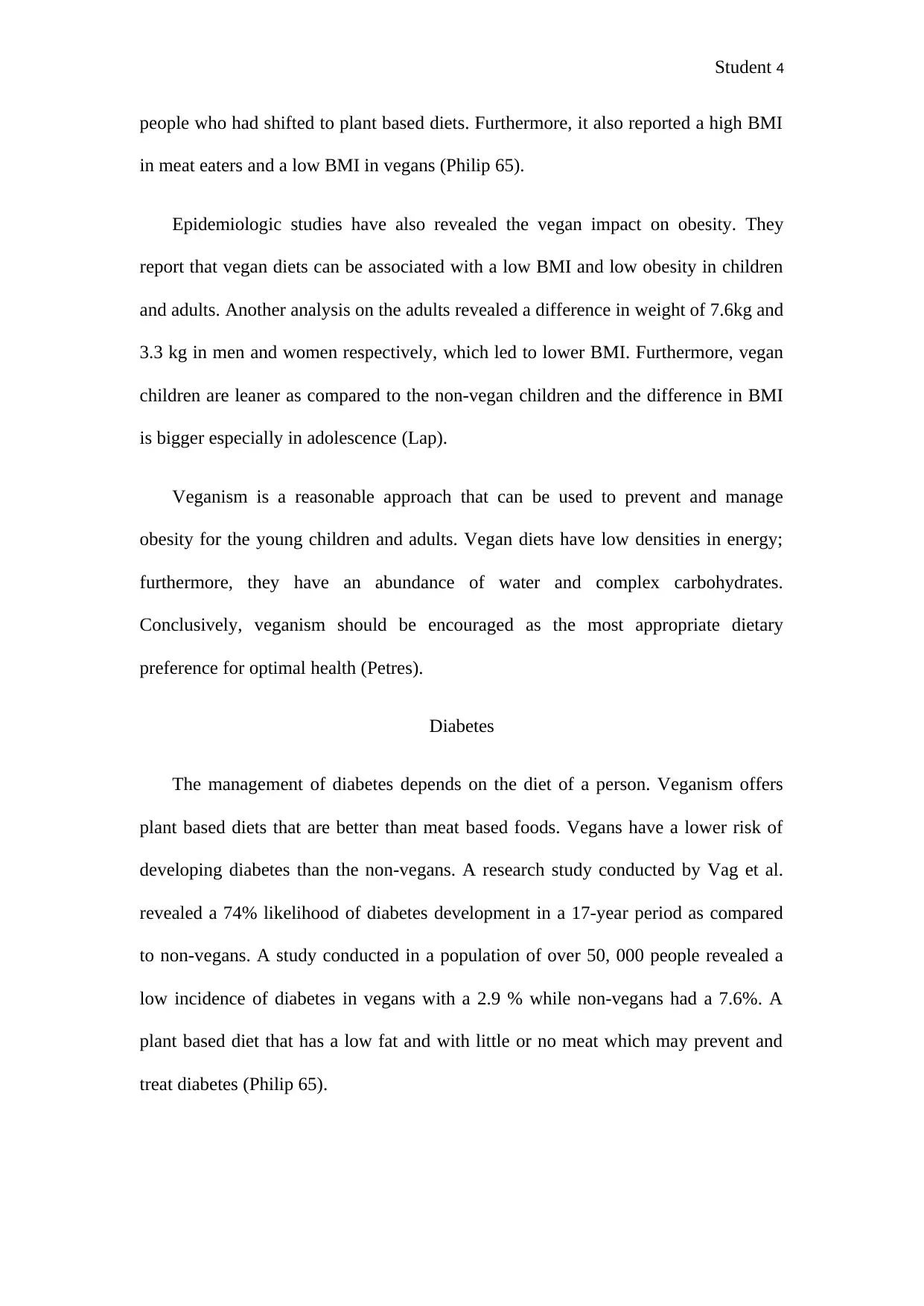
Student 4
people who had shifted to plant based diets. Furthermore, it also reported a high BMI
in meat eaters and a low BMI in vegans (Philip 65).
Epidemiologic studies have also revealed the vegan impact on obesity. They
report that vegan diets can be associated with a low BMI and low obesity in children
and adults. Another analysis on the adults revealed a difference in weight of 7.6kg and
3.3 kg in men and women respectively, which led to lower BMI. Furthermore, vegan
children are leaner as compared to the non-vegan children and the difference in BMI
is bigger especially in adolescence (Lap).
Veganism is a reasonable approach that can be used to prevent and manage
obesity for the young children and adults. Vegan diets have low densities in energy;
furthermore, they have an abundance of water and complex carbohydrates.
Conclusively, veganism should be encouraged as the most appropriate dietary
preference for optimal health (Petres).
Diabetes
The management of diabetes depends on the diet of a person. Veganism offers
plant based diets that are better than meat based foods. Vegans have a lower risk of
developing diabetes than the non-vegans. A research study conducted by Vag et al.
revealed a 74% likelihood of diabetes development in a 17-year period as compared
to non-vegans. A study conducted in a population of over 50, 000 people revealed a
low incidence of diabetes in vegans with a 2.9 % while non-vegans had a 7.6%. A
plant based diet that has a low fat and with little or no meat which may prevent and
treat diabetes (Philip 65).
people who had shifted to plant based diets. Furthermore, it also reported a high BMI
in meat eaters and a low BMI in vegans (Philip 65).
Epidemiologic studies have also revealed the vegan impact on obesity. They
report that vegan diets can be associated with a low BMI and low obesity in children
and adults. Another analysis on the adults revealed a difference in weight of 7.6kg and
3.3 kg in men and women respectively, which led to lower BMI. Furthermore, vegan
children are leaner as compared to the non-vegan children and the difference in BMI
is bigger especially in adolescence (Lap).
Veganism is a reasonable approach that can be used to prevent and manage
obesity for the young children and adults. Vegan diets have low densities in energy;
furthermore, they have an abundance of water and complex carbohydrates.
Conclusively, veganism should be encouraged as the most appropriate dietary
preference for optimal health (Petres).
Diabetes
The management of diabetes depends on the diet of a person. Veganism offers
plant based diets that are better than meat based foods. Vegans have a lower risk of
developing diabetes than the non-vegans. A research study conducted by Vag et al.
revealed a 74% likelihood of diabetes development in a 17-year period as compared
to non-vegans. A study conducted in a population of over 50, 000 people revealed a
low incidence of diabetes in vegans with a 2.9 % while non-vegans had a 7.6%. A
plant based diet that has a low fat and with little or no meat which may prevent and
treat diabetes (Philip 65).
Paraphrase This Document
Need a fresh take? Get an instant paraphrase of this document with our AI Paraphraser
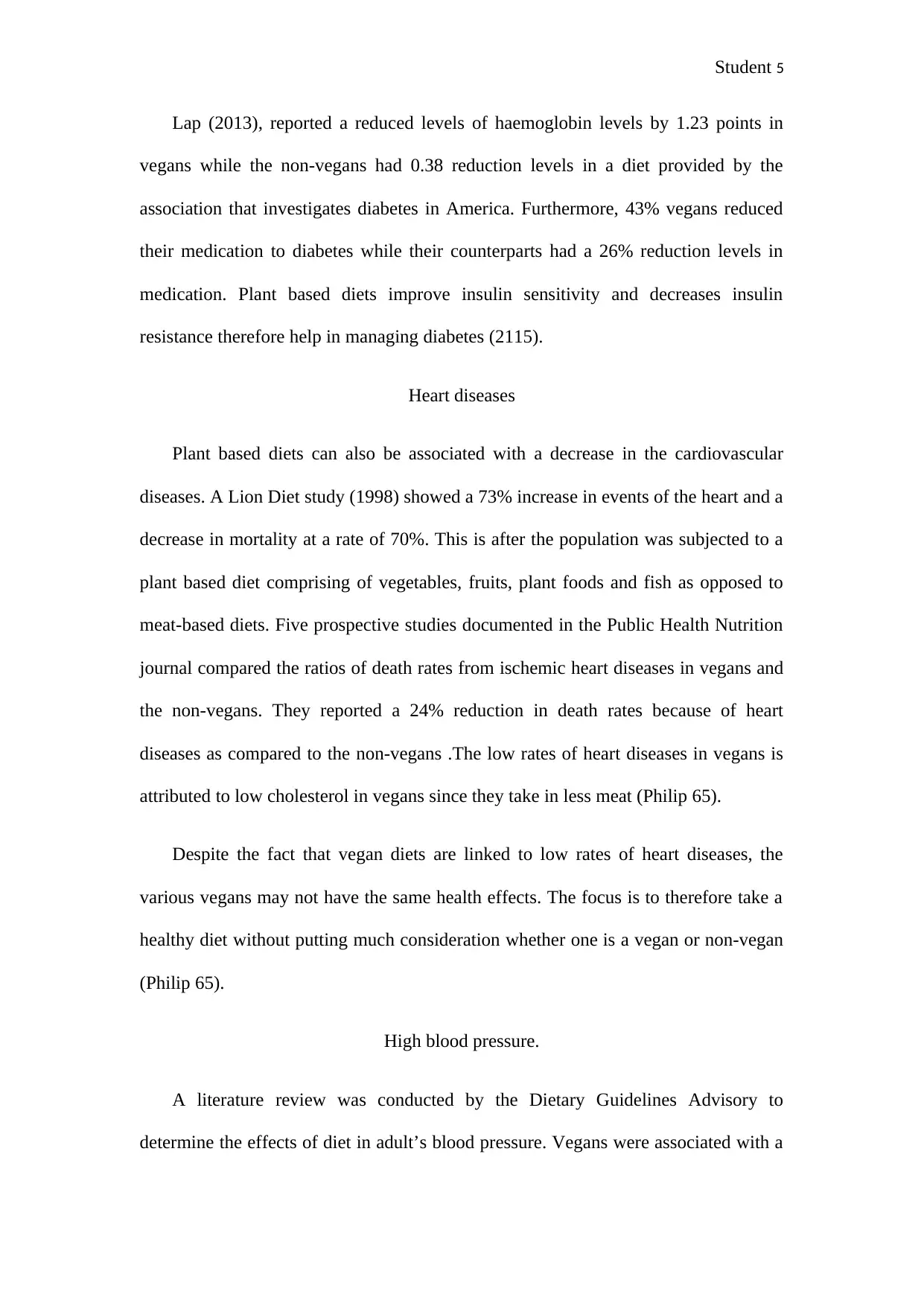
Student 5
Lap (2013), reported a reduced levels of haemoglobin levels by 1.23 points in
vegans while the non-vegans had 0.38 reduction levels in a diet provided by the
association that investigates diabetes in America. Furthermore, 43% vegans reduced
their medication to diabetes while their counterparts had a 26% reduction levels in
medication. Plant based diets improve insulin sensitivity and decreases insulin
resistance therefore help in managing diabetes (2115).
Heart diseases
Plant based diets can also be associated with a decrease in the cardiovascular
diseases. A Lion Diet study (1998) showed a 73% increase in events of the heart and a
decrease in mortality at a rate of 70%. This is after the population was subjected to a
plant based diet comprising of vegetables, fruits, plant foods and fish as opposed to
meat-based diets. Five prospective studies documented in the Public Health Nutrition
journal compared the ratios of death rates from ischemic heart diseases in vegans and
the non-vegans. They reported a 24% reduction in death rates because of heart
diseases as compared to the non-vegans .The low rates of heart diseases in vegans is
attributed to low cholesterol in vegans since they take in less meat (Philip 65).
Despite the fact that vegan diets are linked to low rates of heart diseases, the
various vegans may not have the same health effects. The focus is to therefore take a
healthy diet without putting much consideration whether one is a vegan or non-vegan
(Philip 65).
High blood pressure.
A literature review was conducted by the Dietary Guidelines Advisory to
determine the effects of diet in adult’s blood pressure. Vegans were associated with a
Lap (2013), reported a reduced levels of haemoglobin levels by 1.23 points in
vegans while the non-vegans had 0.38 reduction levels in a diet provided by the
association that investigates diabetes in America. Furthermore, 43% vegans reduced
their medication to diabetes while their counterparts had a 26% reduction levels in
medication. Plant based diets improve insulin sensitivity and decreases insulin
resistance therefore help in managing diabetes (2115).
Heart diseases
Plant based diets can also be associated with a decrease in the cardiovascular
diseases. A Lion Diet study (1998) showed a 73% increase in events of the heart and a
decrease in mortality at a rate of 70%. This is after the population was subjected to a
plant based diet comprising of vegetables, fruits, plant foods and fish as opposed to
meat-based diets. Five prospective studies documented in the Public Health Nutrition
journal compared the ratios of death rates from ischemic heart diseases in vegans and
the non-vegans. They reported a 24% reduction in death rates because of heart
diseases as compared to the non-vegans .The low rates of heart diseases in vegans is
attributed to low cholesterol in vegans since they take in less meat (Philip 65).
Despite the fact that vegan diets are linked to low rates of heart diseases, the
various vegans may not have the same health effects. The focus is to therefore take a
healthy diet without putting much consideration whether one is a vegan or non-vegan
(Philip 65).
High blood pressure.
A literature review was conducted by the Dietary Guidelines Advisory to
determine the effects of diet in adult’s blood pressure. Vegans were associated with a
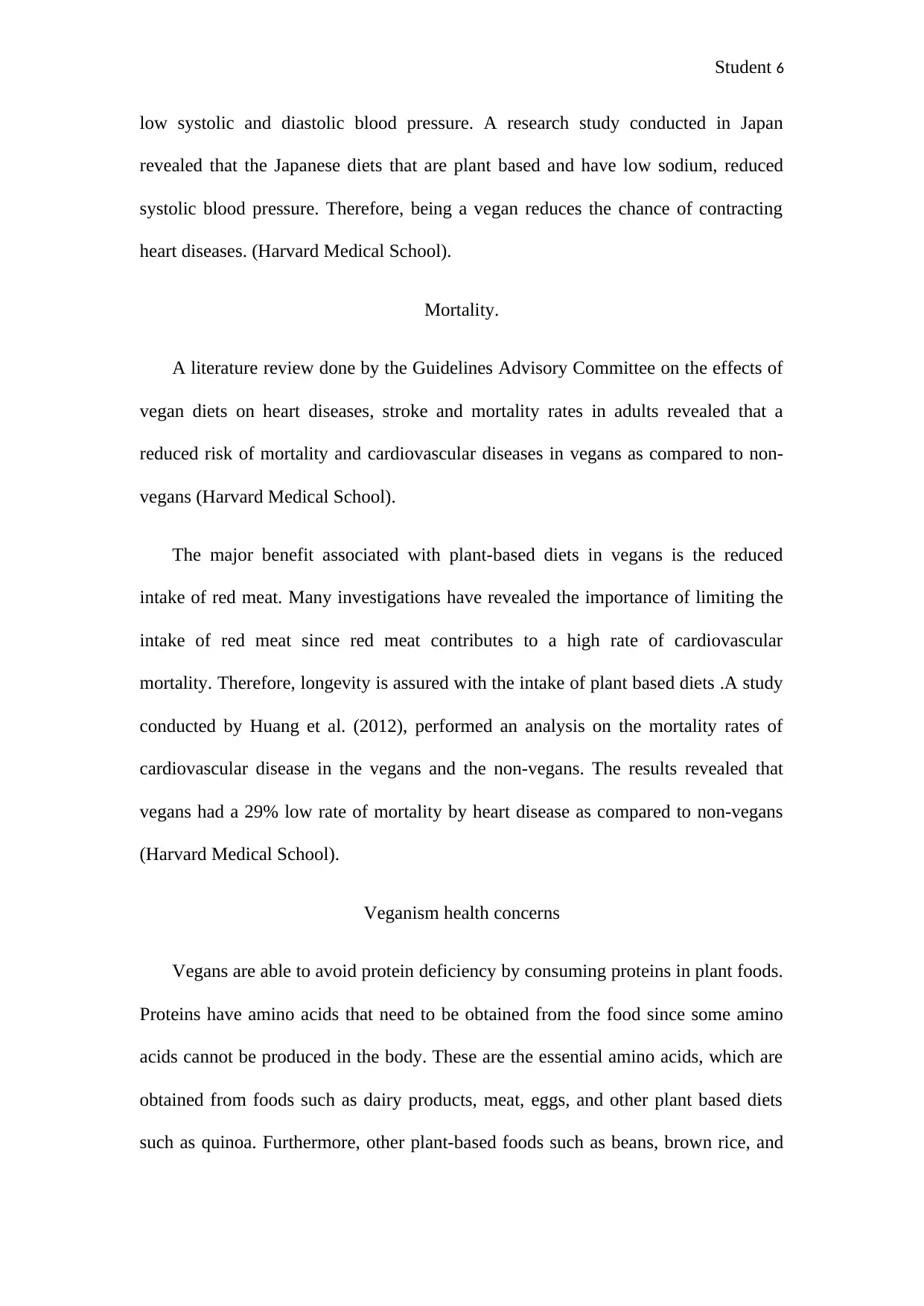
Student 6
low systolic and diastolic blood pressure. A research study conducted in Japan
revealed that the Japanese diets that are plant based and have low sodium, reduced
systolic blood pressure. Therefore, being a vegan reduces the chance of contracting
heart diseases. (Harvard Medical School).
Mortality.
A literature review done by the Guidelines Advisory Committee on the effects of
vegan diets on heart diseases, stroke and mortality rates in adults revealed that a
reduced risk of mortality and cardiovascular diseases in vegans as compared to non-
vegans (Harvard Medical School).
The major benefit associated with plant-based diets in vegans is the reduced
intake of red meat. Many investigations have revealed the importance of limiting the
intake of red meat since red meat contributes to a high rate of cardiovascular
mortality. Therefore, longevity is assured with the intake of plant based diets .A study
conducted by Huang et al. (2012), performed an analysis on the mortality rates of
cardiovascular disease in the vegans and the non-vegans. The results revealed that
vegans had a 29% low rate of mortality by heart disease as compared to non-vegans
(Harvard Medical School).
Veganism health concerns
Vegans are able to avoid protein deficiency by consuming proteins in plant foods.
Proteins have amino acids that need to be obtained from the food since some amino
acids cannot be produced in the body. These are the essential amino acids, which are
obtained from foods such as dairy products, meat, eggs, and other plant based diets
such as quinoa. Furthermore, other plant-based foods such as beans, brown rice, and
low systolic and diastolic blood pressure. A research study conducted in Japan
revealed that the Japanese diets that are plant based and have low sodium, reduced
systolic blood pressure. Therefore, being a vegan reduces the chance of contracting
heart diseases. (Harvard Medical School).
Mortality.
A literature review done by the Guidelines Advisory Committee on the effects of
vegan diets on heart diseases, stroke and mortality rates in adults revealed that a
reduced risk of mortality and cardiovascular diseases in vegans as compared to non-
vegans (Harvard Medical School).
The major benefit associated with plant-based diets in vegans is the reduced
intake of red meat. Many investigations have revealed the importance of limiting the
intake of red meat since red meat contributes to a high rate of cardiovascular
mortality. Therefore, longevity is assured with the intake of plant based diets .A study
conducted by Huang et al. (2012), performed an analysis on the mortality rates of
cardiovascular disease in the vegans and the non-vegans. The results revealed that
vegans had a 29% low rate of mortality by heart disease as compared to non-vegans
(Harvard Medical School).
Veganism health concerns
Vegans are able to avoid protein deficiency by consuming proteins in plant foods.
Proteins have amino acids that need to be obtained from the food since some amino
acids cannot be produced in the body. These are the essential amino acids, which are
obtained from foods such as dairy products, meat, eggs, and other plant based diets
such as quinoa. Furthermore, other plant-based foods such as beans, brown rice, and
⊘ This is a preview!⊘
Do you want full access?
Subscribe today to unlock all pages.

Trusted by 1+ million students worldwide
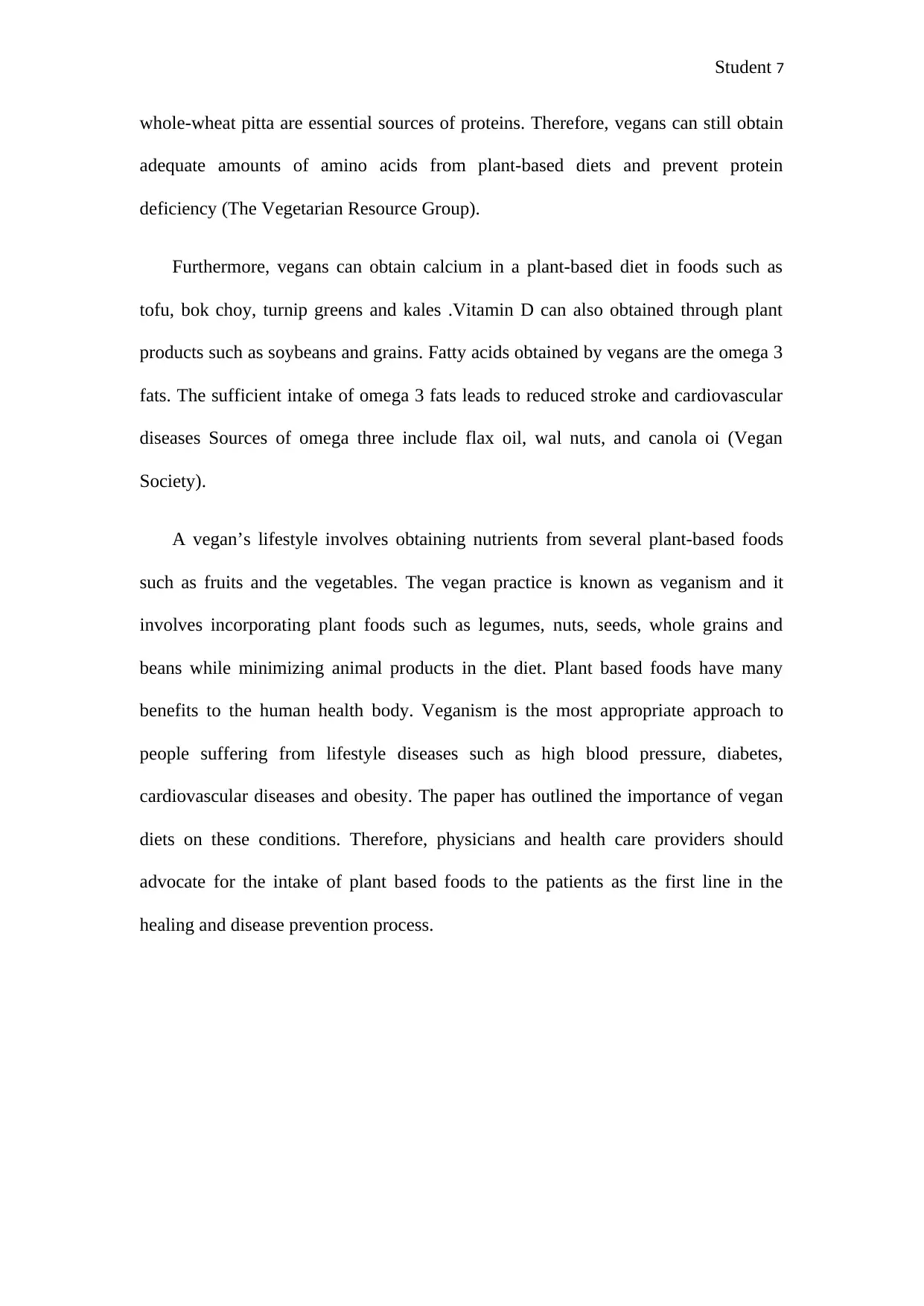
Student 7
whole-wheat pitta are essential sources of proteins. Therefore, vegans can still obtain
adequate amounts of amino acids from plant-based diets and prevent protein
deficiency (The Vegetarian Resource Group).
Furthermore, vegans can obtain calcium in a plant-based diet in foods such as
tofu, bok choy, turnip greens and kales .Vitamin D can also obtained through plant
products such as soybeans and grains. Fatty acids obtained by vegans are the omega 3
fats. The sufficient intake of omega 3 fats leads to reduced stroke and cardiovascular
diseases Sources of omega three include flax oil, wal nuts, and canola oi (Vegan
Society).
A vegan’s lifestyle involves obtaining nutrients from several plant-based foods
such as fruits and the vegetables. The vegan practice is known as veganism and it
involves incorporating plant foods such as legumes, nuts, seeds, whole grains and
beans while minimizing animal products in the diet. Plant based foods have many
benefits to the human health body. Veganism is the most appropriate approach to
people suffering from lifestyle diseases such as high blood pressure, diabetes,
cardiovascular diseases and obesity. The paper has outlined the importance of vegan
diets on these conditions. Therefore, physicians and health care providers should
advocate for the intake of plant based foods to the patients as the first line in the
healing and disease prevention process.
whole-wheat pitta are essential sources of proteins. Therefore, vegans can still obtain
adequate amounts of amino acids from plant-based diets and prevent protein
deficiency (The Vegetarian Resource Group).
Furthermore, vegans can obtain calcium in a plant-based diet in foods such as
tofu, bok choy, turnip greens and kales .Vitamin D can also obtained through plant
products such as soybeans and grains. Fatty acids obtained by vegans are the omega 3
fats. The sufficient intake of omega 3 fats leads to reduced stroke and cardiovascular
diseases Sources of omega three include flax oil, wal nuts, and canola oi (Vegan
Society).
A vegan’s lifestyle involves obtaining nutrients from several plant-based foods
such as fruits and the vegetables. The vegan practice is known as veganism and it
involves incorporating plant foods such as legumes, nuts, seeds, whole grains and
beans while minimizing animal products in the diet. Plant based foods have many
benefits to the human health body. Veganism is the most appropriate approach to
people suffering from lifestyle diseases such as high blood pressure, diabetes,
cardiovascular diseases and obesity. The paper has outlined the importance of vegan
diets on these conditions. Therefore, physicians and health care providers should
advocate for the intake of plant based foods to the patients as the first line in the
healing and disease prevention process.
Paraphrase This Document
Need a fresh take? Get an instant paraphrase of this document with our AI Paraphraser
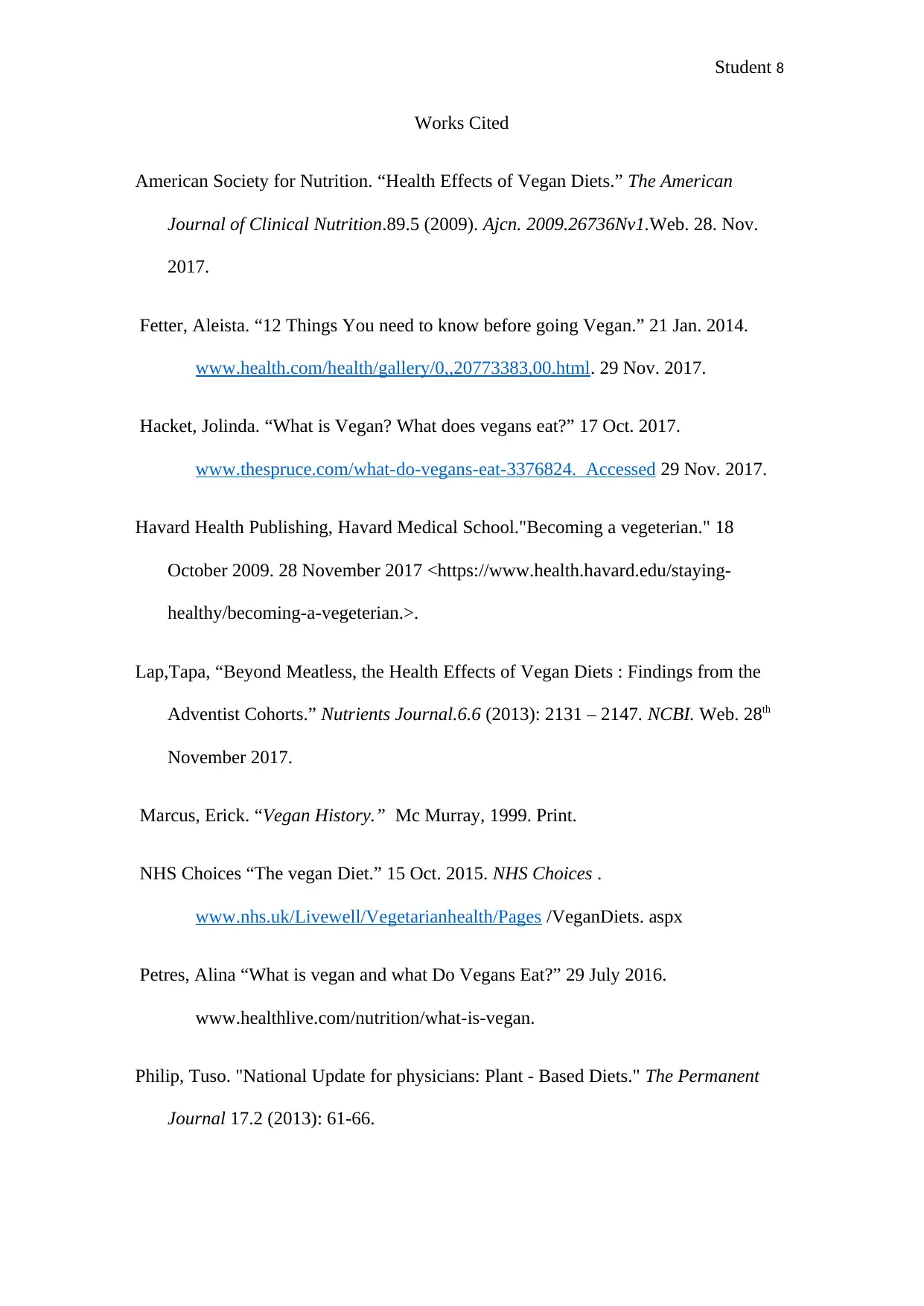
Student 8
Works Cited
American Society for Nutrition. “Health Effects of Vegan Diets.” The American
Journal of Clinical Nutrition.89.5 (2009). Ajcn. 2009.26736Nv1.Web. 28. Nov.
2017.
Fetter, Aleista. “12 Things You need to know before going Vegan.” 21 Jan. 2014.
www.health.com/health/gallery/0,,20773383,00.html. 29 Nov. 2017.
Hacket, Jolinda. “What is Vegan? What does vegans eat?” 17 Oct. 2017.
www.thespruce.com/what-do-vegans-eat-3376824. Accessed 29 Nov. 2017.
Havard Health Publishing, Havard Medical School."Becoming a vegeterian." 18
October 2009. 28 November 2017 <https://www.health.havard.edu/staying-
healthy/becoming-a-vegeterian.>.
Lap,Tapa, “Beyond Meatless, the Health Effects of Vegan Diets : Findings from the
Adventist Cohorts.” Nutrients Journal.6.6 (2013): 2131 – 2147. NCBI. Web. 28th
November 2017.
Marcus, Erick. “Vegan History.” Mc Murray, 1999. Print.
NHS Choices “The vegan Diet.” 15 Oct. 2015. NHS Choices .
www.nhs.uk/Livewell/Vegetarianhealth/Pages /VeganDiets. aspx
Petres, Alina “What is vegan and what Do Vegans Eat?” 29 July 2016.
www.healthlive.com/nutrition/what-is-vegan.
Philip, Tuso. "National Update for physicians: Plant - Based Diets." The Permanent
Journal 17.2 (2013): 61-66.
Works Cited
American Society for Nutrition. “Health Effects of Vegan Diets.” The American
Journal of Clinical Nutrition.89.5 (2009). Ajcn. 2009.26736Nv1.Web. 28. Nov.
2017.
Fetter, Aleista. “12 Things You need to know before going Vegan.” 21 Jan. 2014.
www.health.com/health/gallery/0,,20773383,00.html. 29 Nov. 2017.
Hacket, Jolinda. “What is Vegan? What does vegans eat?” 17 Oct. 2017.
www.thespruce.com/what-do-vegans-eat-3376824. Accessed 29 Nov. 2017.
Havard Health Publishing, Havard Medical School."Becoming a vegeterian." 18
October 2009. 28 November 2017 <https://www.health.havard.edu/staying-
healthy/becoming-a-vegeterian.>.
Lap,Tapa, “Beyond Meatless, the Health Effects of Vegan Diets : Findings from the
Adventist Cohorts.” Nutrients Journal.6.6 (2013): 2131 – 2147. NCBI. Web. 28th
November 2017.
Marcus, Erick. “Vegan History.” Mc Murray, 1999. Print.
NHS Choices “The vegan Diet.” 15 Oct. 2015. NHS Choices .
www.nhs.uk/Livewell/Vegetarianhealth/Pages /VeganDiets. aspx
Petres, Alina “What is vegan and what Do Vegans Eat?” 29 July 2016.
www.healthlive.com/nutrition/what-is-vegan.
Philip, Tuso. "National Update for physicians: Plant - Based Diets." The Permanent
Journal 17.2 (2013): 61-66.

Student 9
The Vegetarian Resource Group. "Veganism in a Nutshell."2017. 28 November 2017
<https://www.vrg.org/nutshell/vegan.htm>.
Vegan Society. “Why go vegan. ” 1 Nov. 2017. www.vegansociety.com/why-go-
vegan. Accessed 29 November 2017.
The Vegetarian Resource Group. "Veganism in a Nutshell."2017. 28 November 2017
<https://www.vrg.org/nutshell/vegan.htm>.
Vegan Society. “Why go vegan. ” 1 Nov. 2017. www.vegansociety.com/why-go-
vegan. Accessed 29 November 2017.
⊘ This is a preview!⊘
Do you want full access?
Subscribe today to unlock all pages.

Trusted by 1+ million students worldwide
1 out of 9
Related Documents
Your All-in-One AI-Powered Toolkit for Academic Success.
+13062052269
info@desklib.com
Available 24*7 on WhatsApp / Email
![[object Object]](/_next/static/media/star-bottom.7253800d.svg)
Unlock your academic potential
Copyright © 2020–2026 A2Z Services. All Rights Reserved. Developed and managed by ZUCOL.





